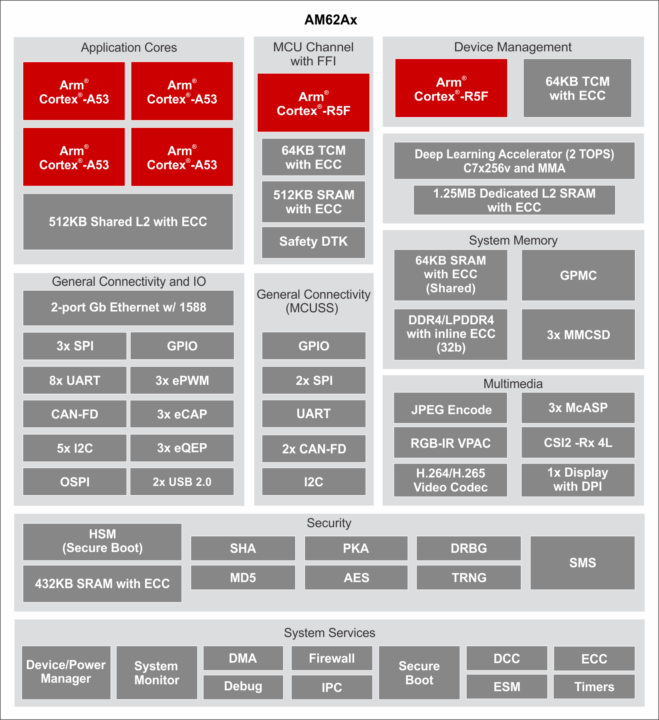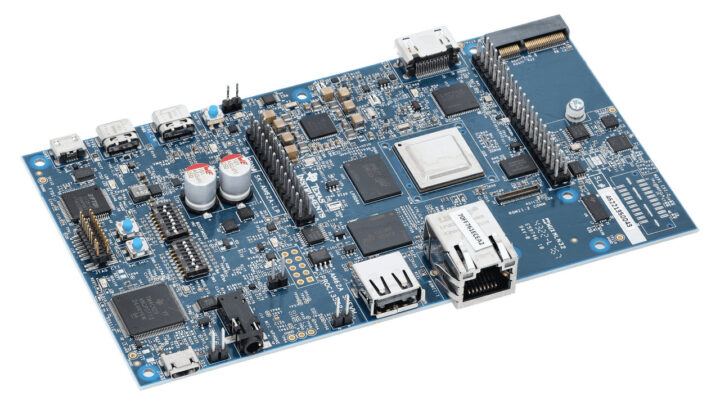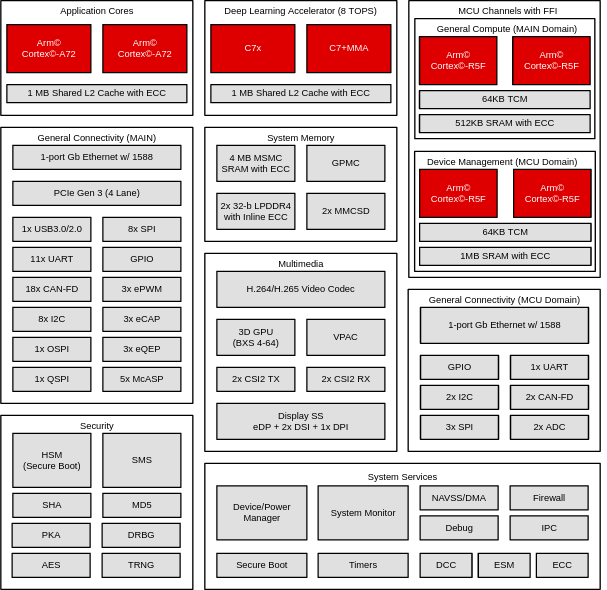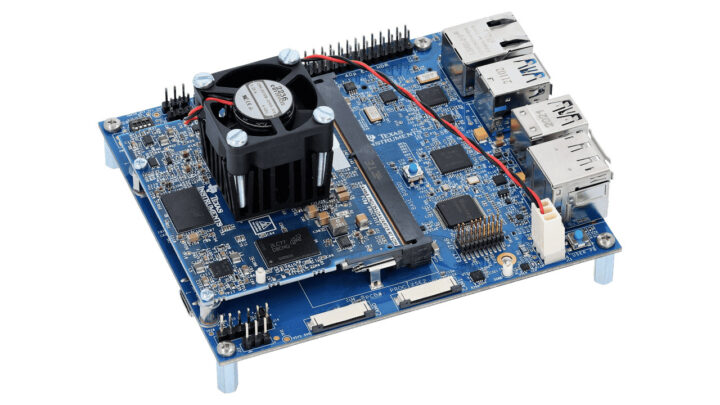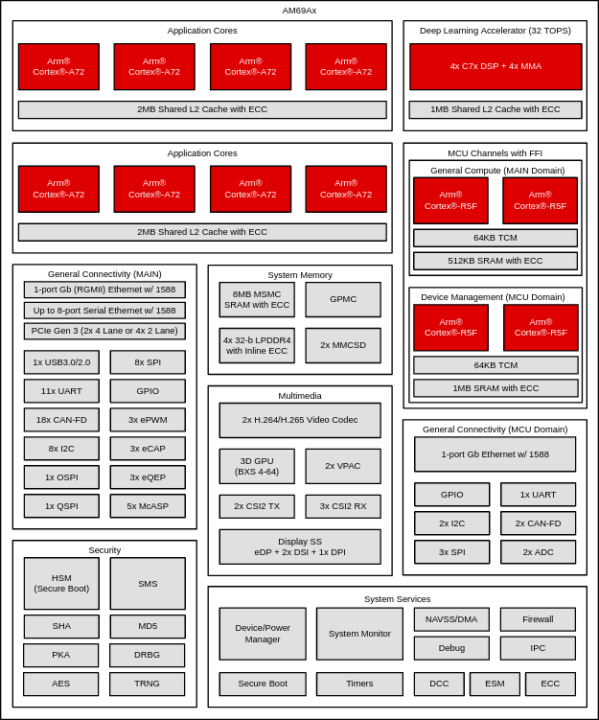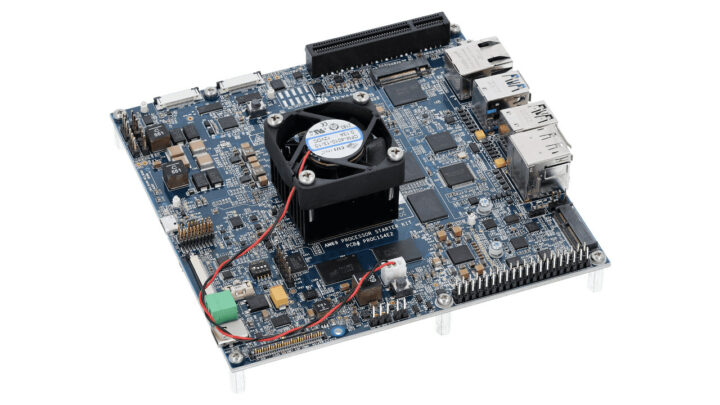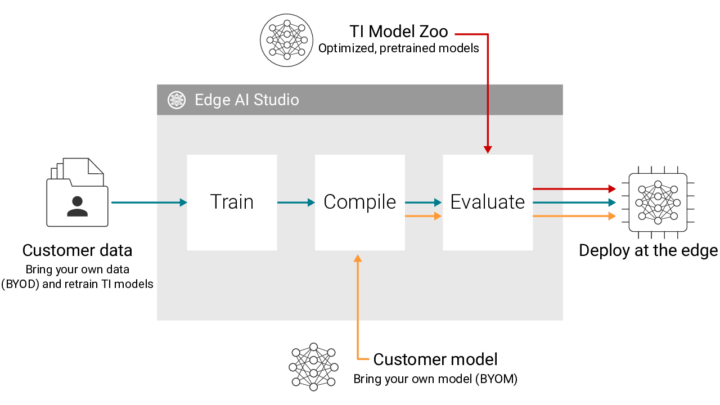Texas Instruments AM62A, AM8, and AM69A Arm Cortex-A53 or Cortex-A72 Vision processors come with 2 to 8 CPU cores and deep learning accelerators delivering from 1 TOPS to 32 TOPS for low-power vision and artificial intelligence (AI) processing in applications such as video doorbells, machine vision, and autonomous mobile robots.
Three families and a total of 6 parts are available:
- AM62A3, AM62A3-Q1, AM62A7, and AM62A7-Q1 single to quad-core Cortex-A53 processors support one to two cameras at less than 2W in applications such as video doorbells and smart retail systems. Equipped with a 1TOPS vision processor, the AM62A3 is the cheapest model of the family going for US$12 in 1,000-unit quantities.
- AM68A dual-core Cortex-A72 processor can handle one to eight cameras in applications like machine vision, with up to 8 TOPS of AI processing for video analytics.
- AM69A octa-core Cortex-A72 SoC supports up to 12 cameras and achieves up to 32 TOPS of AI processing for high-performance applications such as edge AI boxes, autonomous mobile robots, and traffic monitoring systems.
TI AM62A3/A7 summary and devkit
Key features:
- Application processor – 1x to 4x Arm Cortex-A53 cores at up to 1.4 GHz with 512KB shared L2 cache with ECC
- MCU core – 1x Cortex-R5F real-time core at up to 800 MHz with 64KB TCM, 512KB SRAM
- AI accelerators
- Deep Learning Accelerator based on Single-core C7x at 1.0 GHz
- C7x floating point up to 40 GFLOPS, 256-bit Vector DSP
- Matrix Multiply Accelerator (MMA) up to 2 TOPS for AM62A7 or 1 TOPS for AM62A3
- Vision Processing Accelerators (VPAC) with Image Signal Processor (ISP)
- Deep Learning Accelerator based on Single-core C7x at 1.0 GHz
- Video Encoder/Decoder – H.265, H.264 decoding up to 4K, Motion JPEG encode up to 4K UHD
- System Memory – Up to 8GB LPDDR4
- Storage
- 3x Secure Digital (SD) (4b+4b+8b) interfaces
- 1× General-Purpose Memory Controller (GPMC)
- OSPI/QSPI with DDR / SDR support up to 4GB
- Display – MIPI DPI (24-bit RGB parallel interface)
- Camera – 4-lane MIPI CSI-2
- Networking – 2x Gigabit Ethernet interfaces, TSN
- USB – 2x USB 2.0
- Other peripheral interfaces
- 9x UART, 5x SPI, 6x I2C
- 3x Multichannel Audio Serial Ports (McASP) with TDM, I2S, SPDIF support
- 3x enhanced PWM modules (ePWM)
- 3x enhanced Quadrature Encoder Pulse modules (eQEP)
- 3x enhanced Capture modules (eCAP)
- General-Purpose I/O (GPIO), All LVCMOS I/O can be configured as GPIO
- 3x Controller Area Network (CAN) modules with CAN-FD support
- Security – Secure boot, Arm Trustzone-based TEE, Cryptographic acceleration
- Functional Safety (FuSa) compliance for -Q1 parts
- Package – 18 mm x 18 mm, 0.8-mm pitch full-array, 484-pin FCBGA (AMB)
- Temperature Range – -40 to 125°C
- Process – 16-nm FinFET technology
The “Q1” parts are the same, except they are made for the automotive market with AEC-Q100 qualifications for high-reliability automotive applications targeting zero defects.
The AM62A processor runs Linux and an RTOS, and TI offers the $249 SK-AM62A-LP starter kit (SK) supporting up to 5MP @ 60 fps, and programmable via Code Composer Studio IDE (CCSTUDIO).
TI AM68A highlights
AM68A specifications:
- Application processor – 2x Arm Cortex-A72 cores at up to 2.0 GHz with 1MB shared L2 cache with ECC
- MCU core – 4x Cortex-R5F real-time core at up to 1.0 GHz
- GPU – Imagination Technologies BXS-4-64 up to 800 MHz
- AI accelerators
- Deep Learning Accelerators up to 8 TOPS
- Vision Processing Accelerators (VPAC) with Image Signal Processor (ISP)
- Video Encoder/Decoder – H.265, H.264 decoding/encoding up to 4Kp60
- System Memory – LPDDR4
- Storage
- eMMC 5.1
- 1x SD3.0/SDIO3.0
- 2x flash interfaces configured as
- One OSPI or HyperBus or QSPI, and
- One QSPI
- Up to 4x Display
- Up to 2x DSI 4L TX (up to 2.5K)
- 1x 4-lane eDP
- 1x MIPI DPI 24-bit RGB parallel interface
- 2x 4-lane OLDI/LVDS and 24-bit RGB parallel interface
- Camera
- 2x 4-lane MIPI CSI-2 (CSI-Rx)
- 1x 4-lane MIPI CSI-2 (CSI-Tx) with DPHY
- Networking – 2x Gigabit Ethernet interfaces
- USB – 1x USB 3.0 dual-role device (DRD) subsystem
- PCIe – 1x PCIe Gen3 controller with up to four lanes
- Other peripheral interfaces
- 11x UART, 8x SPI, 8x I2C
- 5x Multichannel Audio Serial Ports (McASP) with TDM, I2S, SPDIF support
- 3x enhanced PWM modules (ePWM)
- 3x enhanced Quadrature Encoder Pulse modules (eQEP)
- 3x enhanced Capture modules (eCAP)
- General-Purpose I/O (GPIO), All LVCMOS I/O can be configured as GPIO
- 18x CAN-FD
- Security – Secure boot, Cryptographic acceleration
- Package – 23 x 23 mm, 0.8-mm pitch, 770-pin FCBGA (ALZ)
- Temperature Range – TBD
- Process – 16 nm FinFET technology
Texas Instruments AM68x vision SoC can be evaluated with the SK-AM68 Starter Kit offering two 22-pin Raspberry Pi CSI connectors and two 40-pin MIPI CSI-2 expansion connectors for up to 8 cameras. This EVM also costs $249; more details may be found on the product page.
TI AM69A short specs and development kit
AM69x features highlights:
- Application processor – 8x Arm Cortex-A72 cores at up to 2.0 GHz with 2MB shared L2 cache with ECC
- MCU core – 4x Cortex-R5F real-time core at up to 1.0 GHz
- GPU – Imagination Technologies BXS-4-64 up to 800 MHz
- AI accelerators
- 4x Deep Learning Accelerator up to 32 TOPS
- 2x Vision Processing Accelerators (VPAC) with Image Signal Processor (ISP)
- 2x Video Encoder/Decoder – H.265, H.264 decoding/encoding up to 4Kp60
- System Memory – LPDDR4
- Storage
- 2-lane UFS 2.1 interface
- eMMC 5.1
- 1x SD3.0/SDIO3.0
- 2x flash interfaces configured as
- One OSPI or HyperBus or QSPI, and
- One QSPI
- Up to 4x Display
- Up to 2x DSI 4L TX (up to 2.5K)
- 1x 4-lane eDP
- 1x MIPI DPI 24-bit RGB parallel interface
- 2x 4-lane OLDI/LVDS and 24-bit RGB parallel interface
- Camera
- 3x 4-lane MIPI CSI-2 (CSI-Rx)
- 2x 4-lane MIPI CSI-2 (CSI-Tx) with DPHY
- Networking
- 8-port Ethernet switch with all ports supporting GbE and 2.5GbE, and 2x ports also supporting 5Gb, 10Gb USXGMII or 5Gb XFI
- 2x Gigabit Ethernet interfaces
- USB – 1x USB 3.0 dual-role device (DRD) subsystem
- PCIe – Up to 4x 2-lane or 2x 4-lane PCIe Gen3 PCIe Gen3 controllers
- Other peripheral interfaces
- 11x UART, 8x SPI, 8x I2C
- 5x Multichannel Audio Serial Ports (McASP) with TDM, I2S, SPDIF support
- 3x enhanced PWM modules (ePWM)
- 3x enhanced Quadrature Encoder Pulse modules (eQEP)
- 3x enhanced Capture modules (eCAP)
- General-Purpose I/O (GPIO), All LVCMOS I/O can be configured as GPIO
- 20x Modular Controller Area Network (MCAN) modules with full CAN-FD support
- Security – Secure boot, Cryptographic acceleration
- Functional Safety support up to ASIL-D
- Package – 31 x 31 mm, 0.8-mm pitch, 1414-pin FCBGA (ALY),
- Temperature Range – TBD
- Process – 16 nm FinFET technology
The $299 SK-AM69 Starter Kit/Evaluation Module (EVM) can be used to evaluate the AM69A AI vision processor with two 22-pin Raspberry Pi CSI connectors and two 40-pin MIPI CSI-2 expansion connectors for up to 12 cameras.
All AM62A, AM68A, and AM68A SoCs support Linux application development, standard development tools such as Code Composer Studio (CCS), as well as the upcoming (Q2 2023) Edge AI Studio free web-based open-source tool to develop and test AI models quickly and easily using user-created models and TI’s optimized models. Supported frameworks include TensorFlow, PyTorch, ONNX, TVM, and others.
Availability and pricing
Texas Instruments AM68A processors are available in production quantities from TI or distributors, and pre-production samples of the AM62A and the AM69A are available through TI only. As mentioned in the introduction, pricing starts at $12 per piece for 1,000-unit orders for the single-core Cortex-A53 AM62A processors. More details may be found on the product page and the press release.
Thanks to TLS for the tip.

Jean-Luc started CNX Software in 2010 as a part-time endeavor, before quitting his job as a software engineering manager, and starting to write daily news, and reviews full time later in 2011.
Support CNX Software! Donate via cryptocurrencies, become a Patron on Patreon, or purchase goods on Amazon or Aliexpress


